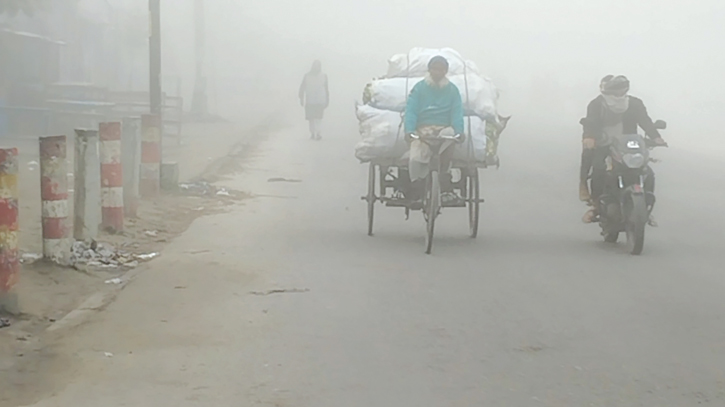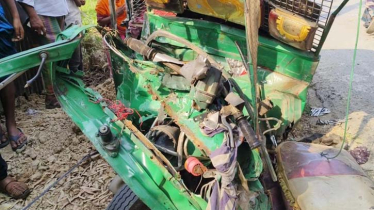
Photo : Messenger
In the picturesque Rangpur region, particularly in Kurigram district, a biting cold wave from the Himalayan belt is wreaking havoc on the lives of the lower-income groups and daily wage laborers. As the Bangla month of Poush draws to a close, the residents find themselves grappling with the unforgiving cold, causing widespread suffering.
The entire district is shrouded in thick fog until 11:00 am, with the elusive sun refusing to make an appearance. Consequently, all forms of transportation navigate through the haze with headlights ablaze. The vulnerable segments of the population, including infants and the elderly, are succumbing to various cold-related illnesses, a plight that has persisted for several days.
Afsar Ali, a 44-year-old van driver from Velakopa village under Kurigram municipality, shared his struggle, stating, "My hands and legs become senseless due to the biting cold wave in the morning as I have to drive with goods and vegetables since the vegetable market opens early."
Sujon Miah, a 52-year-old auto-rickshaw driver at Kurigram Dharla Bridge area, echoed similar sentiments. "I have to support my family of five members hand to mouth with my daily earnings. I am compelled to drive the auto-rickshaw despite the dense fog and biting cold wave, which feels like ice," he lamented.
Even when the sun manages to break through the fog, its feeble rays provide little respite, according to some shopkeepers.
Desperate to stay warm, poor and ultra-poor individuals are resorting to burning straw, waste wood, and papers on roadsides in both urban and rural areas, spending winter days in idleness.
A surge in cold-related diseases has prompted men, women, and children to flock to upazila health complexes, including Kurigram General Hospital, seeking treatment, according to hospital sources.
Meanwhile, second-hand cloth traders are experiencing a brisk business as the biting cold wave prompts a rush from the poor and lower-income groups to purchase winter clothes. Hamidul Islam, a 28-year-old second-hand cloth trader in the Kurigram Judge Court area, noted that the prices of second-hand clothes have doubled compared to the previous year.
Abul Kalam Azad, 56, of Nasar Uddin Market, shared a similar observation, emphasizing the considerable increase in prices.
Rabeya Khayun, a 22-year-old resident, expressed her dismay over the rising costs, revealing, "I have purchased two winter cardigans for Tk 600. I will wear one and give the other to my younger sister."
Despite recent aid distributions by government and non-government organizations, it remains insufficient for the cold-hit poor.
Kurigram Deputy Commissioner Mohammad Saidul Arif reported the distribution of 45 thousand blankets to those affected at union and upazila levels. Yet, the dire circumstances suggest an urgent need for more extensive relief measures.
Despite efforts from both government and non-government entities to distribute aid to the cold-affected, the scale of the crisis demands additional support. The dire situation is further exacerbated by a surge in second-hand clothing prices, leaving the most vulnerable struggling to access essential winter garments.
As temperatures plummet, the demand for blankets and warm clothing has soared, outpacing the available resources. The community, left to cope with this harsh reality, looks toward increased assistance to weather this severe winter. Urgent collaborative measures and extended relief initiatives are crucial to mitigate the suffering and ensure the well-being of those grappling with the relentless grip of the biting cold wave in Rangpur.
Messenger/Fameema








